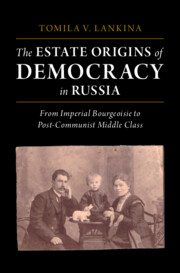‘Tomila Lankina has written a deeply original and meticulously researched study of historical sociology with profound implications for how we understand politics in today's Russia. The Estate Origins of Democracy in Russia challenges the widespread scholarly consensus that communism fundamentally altered Russia's social structure. Instead, Lankina demonstrates important continuities – most significantly, the persistence of the Russian pre-revolutionary middle class through decades of communist rule, and its reemergence in its aftermath.'
Jeffrey Kopstein - Professor of Political Science, University of California, Irvine
‘Tomila Lankina conducts a unique in-depth study of roots and mechanisms of societal resilience and reproduction in Russia for over a century of major transformations. She masterfully combines the use of statistical datasets, extended case studies, macro-sociological interpretations, and micro-historical narratives and offers a novel interdisciplinary framework for a comparative analysis of long-run societal dynamics and its political implications. This book successfully brings society back into our understanding of political developments in Russia and beyond.'
Vladimir Gelman - Professor, European University at St. Petersburg, and University of Helsinki
‘Elegantly crafted, beautifully written, richly illustrated, and rigorously evidenced, this book provides an axial twist to Soviet and Russian history and an exemplary, landmark study of the resilience and reproduction of social structures, social identities, and social distinctions, and their significance for politics. Lankina's masterpiece is Tolstoyan in its epic breadth of coverage, evocative powers, and intimate unpacking of the lives and times of Russia's meshchanstvo.'
John Sidel - Sir Patrick Gillam Chair in International and Comparative Politics, London School of Economics and Political Science
‘This fascinating book challenges our view of the Soviet period as a rupture in Russia's historical development. The author shows that social hierarchies from the late imperial period thrived under communism and also continue to influence human capital, values, and democratic processes in Russia today. In addition to rigorous statistical evidence, she weaves in anecdotes and interviews that make her arguments more vivid and compelling. Anyone interested in historical legacies, social inequality, and democratic development needs to read this meticulously executed book.'
Volha Charnysh - Assistant Professor of Political Science, Massachusetts Institute of Technology
‘The Estate Origins of Democracy in Russia is an exemplar of the new historical political economy. No dilettante, Tomila Lankina does the work of both historian and social scientist in this magisterial work. This is a model for interdisciplinary scholarship.'
Scott Gehlbach - Professor, Department of Political Science and Harris School of Public Policy, University of Chicago
‘In this brilliant, erudite, and broad-ranging work, Lankina provides a novel ‘genealogical' perspective on Russian politics, demonstrating how the Russian Empire's urban middle class continues to influence patterns of political and economic development. In so doing, she questions established understandings of the communist experience and reveals the critical role played by families in the reproduction of forms of social stratification over the long run.'
Mark R. Beissinger - Henry W. Putnam Professor of Politics, Princeton University
'A richly textured study of historical continuities in the face of revolutionary change. Lankina’s meticulous account of the pre-communist origins of Russia’s post-communist society sheds new light on the logics of persistence and resilience in Russian social structure that shape political possibilities in the present day. Estate Origins is a rewarding read for anyone interested in the social requisites of democracy.'
Bryn Rosenfeld - Assistant Professor, Department of Government, Cornell University
‘The Estate Origins of Democracy in Russia is the most inspiring book in Russian studies I have read in the course of the past 10 years or more … There is a wealth of information in the text, and one is often carried away by conjectures or ideas concerning Russian development popping up while reading. ’
Simo Mannila
Source: Eurasian Geography and Economic
'… Lankina presents a rare portrait of hidden middle-class, bourgeois lives, quietly flourishing, or at least enduring, in a subterranean economy in Soviet Russia … Lankina is uniquely qualified to have delved into this topic and her book is an important contribution to the study of twentieth-century Russia, highlighting the previously unrecognized legacy of tsarist estates long after they disappeared.'
Dave Carpenter
Source: International Affairs





